Share

When Diplomacy Fails Podcast
Korean War 16: Selective Perspective
Episode 16: Selective Perspective examines further the American policy towards South Korea in late spring 1950. We open the episode with the arrival of America's ambassador to South Korea John J Muccio (pictured) returning home, to plead in person for the things that Seoul desperately needed. While Muccio did this, the Truman administration set about crafting a perfectly coordinated image of its approach to South Korea, be that through suggestive magazine interviews or tactically ignoring Muccio's recommendations, while giving the impression that he had been listened to.
If the order of the day was to stall Muccio, and to momentarily ease Syngman Rhee's fears, then it was mission accomplished.
As the Truman administration well understood, their policy towards Korea was being watched by the communists, and any signs of hesitation, of a reluctant or unwillingness to support Rhee's regime could all be construed as signals that Washington wouldn't put up much of a fight if the North invaded. This was what Kim Il-sung wanted to hear, and it was also exactly what Washington wanted him to hear. Faced with these bits of evidence, Kim would invade South Korea convinced of the American weakness and hesitation, only to face a total buzzsaw.
The US did have some cause for concern though, when intelligence was received that underlined the sheer number of armoured columns collecting in North Korea. While they required a Northern invasion and an allied holding action, there was a danger that the North would push the allies off the peninsula entirely if the hundreds of T34 tanks burst over the 38th parallel. Thus, Washington engaged in some other policies, seemingly at odds with their plan to sabotage South Korea's defensive capabilities. Task forces, air and naval forces and other preparations would be made. Even while it would seem that the US was unprepared when the North attacked, the arrival of more soldiers in the nick of time in several areas would, hopefully, be enough to plug the gaps. Any suspicion about the American response was a matter of perspective.
******
Music used:
"Shaving Cream" by Benny Bell, released in 1946. Today we have a real gem for you guys - the first true double entendre song of its time, Shaving Cream is...well...you just have to have a listen yourself to see what it's all about. As a tune it remains one of my favourite of the series, and is supremely catchy, I'm sure you'll agree. You can get it for free here:https://archive.org/details/BennyBell
Want to grab yourself some quality, stylish head/ear phones and get 15% off? Use the code WDF to avail of this special offer and start your listening journey with When Diplomacy Fails like never before! See: https://www.sudio.com/eu/
Want to support this podcast in other ways, as we meander through the Korean War? Check out the following links to our social media, shop website, source materials and Patreon below.
Facebook page: https://www.facebook.com/WhenDiplomacyFailsPodcast/
Facebook group: https://www.facebook.com/groups/1856652614380207
Twitter: https://twitter.com/?lang=en
Support us financially on Patreon and access an ad-free episodes ($2 per month) and an hour of extra content ($5 per month): https://www.patreon.com/WhenDiplomacyFails
Visit the website:
More episodes
View all episodes
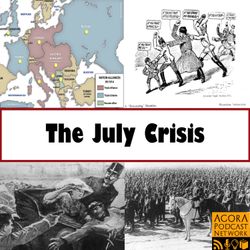
#40: 30 July 1914 II - 'A Very Ticklish Thing'
38:00|As Thursday 30 July progressed, one thing seemed clear to the German Chancellor and Foreign Minister - Austria had to be stopped, before the crisis deteriorated any further.Use the code KAISER to get 40% off your first month of a $5 membership on Patreon - 50+ hours of exclusive content including the Age of Bismarck await!Not sure what to get your favourite history friend? Why not give them the gift of a free month of our $5 membership?The solution appeared to lie in drawing some commitments out of her, and perhaps preparing the ground for some kind of compromise. It was vague, but Bethmann and Jagow depended on Tschirschky, their ambassador to Vienna, to help them over the line. Could Berchtold be persuaded? Tschirschky, in fact, had gone native, but that was far from their only problem.Having pushed matters to this point, Berchtold now feared Berlin might abandon the alliance. To get ahead of this danger, Vienna would have to raise the stakes - she would have to commit to general mobilisation. This was indeed scheduled - for 4 August! Yet in Vienna there was still little awareness of the Russian threat.Perhaps when confronted with the mobilisation of the entire Habsburg army, Russia would back down? If she did not, then Russia would have to begin general mobilisation to defend itself, and Germany would mobilise in response. It seemed like a win-win - either the rival backs down or the ally stands resolute for your punitive war.But the Germans were not so easily ensnared. They had begun to recognise when the Austrians suggested pointless protests or empty devices, and they pressured them for more information. The best method available was through diplomacy. In these final hours of peace, communication channels were kept open, and new proposals, each more unacceptable, emerged from Sazonov's pen.What Sazonov neglected to tell either Vienna or Berlin as he updated his position was that Russia had upped the ante. Tsar Nicholas II had been persuaded to push the big red button after all, and the Central Powers would be forced together. Until this news leaked out though, the two allies were destined to continue their dance.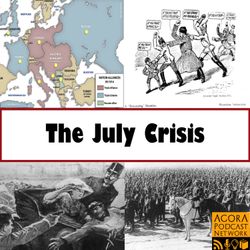
#39: 30 July 1914 I - Caught in the Net
45:37|Use the code KAISER to get 40% off your first month of a $5 membership on Patreon - 50+ hours of exclusive content including the Age of Bismarck await!Not sure what to get your favourite history friend? Why not give them the gift of a free month of our $5 membership?By the morning of 30 July 1914, the German government was undergoing something of an identity crisis. Was Berlin the resolute ally, determined to support Austria whatever the cost, or was she the rational actor, determined to avoid war, even if this proved painful? To the German Chancellor and Foreign Minister, the answer wasn't immediately clear, but they were certain that where Austria was concerned, enough was enough. It was time for Vienna to explain what it planned to do in Serbia, and if necessary, it was time to consider the possibility of compromise, by using any one of the options floated in Europe over the last few days.The reason for this abrupt change in Germany's tone can be explained by news of Russia's mobilisation against Austria. To figures like Jagow, this confirmed that Russia would not remain aloof as Serbia was destroyed. Since the war could not be isolated, it meant nothing less than its expansion, until everyone was pulled in. It was hard to imagine Germany faring well under these circumstances, when Britain was opaque but dubious, and the Italians were insisting that the alliance did not apply since Austria was the aggressor.Jagow and Bethmann Hollweg were thus on the same page, but how much could they get done with the Kaiser watching them so relentlessly, and blowing up in a rage at every slight that arrived by telegram. In Wilhelm's defence, the Tsar's confession that Russia had been mobilising for five days was a damning indictment of Russian policy, especially since he had asked Wilhelm to mediate from the beginning. The Kaiser did not give up, and buoyed by his Ministers, Austria was placed under maximum pressure to clarify its position and step back from the brink. Unfortunately, just as Germany's team got their act together, Austria's supporters moved into place as well, and the war edged ever closer...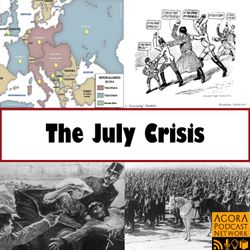
#38: 29 July 1914 IV - Vienna Waits For You!
39:08|Use the code WDF24 at checkout and get 50% off a $5 monthly membership on Patreon! This offer will expire soon!By the evening of 29 July, a new wave of panic was overcoming the German government. In Berlin, the question of restraining Austria had long been treated with a wink and a nod, but news of Russian mobilisation seemed to change everything.For Bethmann Hollweg and Jagow, this change moved them to take a stand against Austrian policy at long last. They demanded answers, compromise, and more information, and the Chancellor was willing to go further still. Although long since forgotten in the mad scramble that followed, Bethmann was sufficiently alarmed to advocate the nuclear option - he would cancel the blank cheque entirely, if Austria did not see sense.This message would be as terrifying as it was confusing for the Austrians, who had frequently been assured of their ally's solidarity, and of their freedom to craft whatever policy they wanted. But with Britain stating its conditional neutrality, France and Russia united in their defiance, and now Italy complaining more forcefully about Austrian behaviour, not even Berlin could ignore that Vienna was forcing it towards the abyss. The real question for the German government as the 29 July became 30 July, was whether they would pull back, or jump.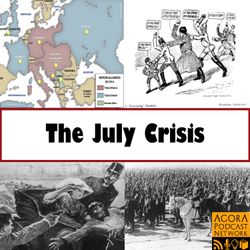
#37: 29 July 1914 III - First Contact, Second Thoughts
39:41|Use the code WDF24 at checkout and get 50% off a $5 monthly membership on Patreon!Austria's bombardment of Belgrade represented the first shots of the First World War, though contemporaries could not have known this yet - they were more focused on what Russia was doing.As news of Russia's partial mobilisation filtered through Europe, it caused a major crisis in the German Foreign Office. For Jagow, Germany's Foreign Minister and director of its policy towards Austria since the beginning, Russia's preparations meant nothing less than the complete collapse of his entire world view.If Russia would not stand back and permit Austrian justice, then surely that meant war was inevitable?Desperate to avoid the European war he feared, Jagow went to great lengths to work out a solution. He believed he found it in the partnership with Bethmann Hollweg, the Chancellor he had spent several weeks undermining. If these two German statesmen could put their heads together, and wrest concessions or at least some answers out of Vienna, perhaps the ruin of their country could be avoided. Troubling signals suggested it would not be easy, yet having led Germany to this point, neither man had much choice but to try.
The Age of Bismarck Wants YOU!
27:34|As we release our fifth episode of the Age of Bismarck, I decided to take advantage of Patreon's new special offer feature, and give you the chance to get 50% off your first month of support! Maybe you're unsure, so why not listen to this extended teaser from the first episode of the Age of Bismarck?If you want the rest of it and more, make sure you listen in, where you'll be given the special code to enter at checkout, giving you access to a world of exclusive history content, includingThe Age of Bismarck, all future episodes and scriptsThe other extra content, including my PhD series and Poland Is Not Yet LostAll regular episodes ad-freeScripts for July Crisis episodes, past series, and so much more!I'm so excited for you to explore all that WDF has to offer, and I can't thank you enough for your support so far.Take me to Patreon, I want 50% off my first month!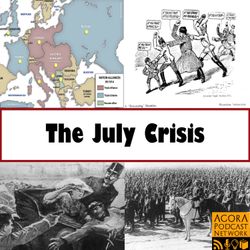
#36: 29 July 1914 II - Shifty Shades of Grey
01:06:29|As they had done up to this point, the British continued to try to find a diplomatic solution to the crisis, even as the opportunities shrank before their eyes. Amidst warnings pinged between London and Berlin that under certain circumstances, their respective neutrality could not be guaranteed, the German Chancellor sent an ill-advised appeal for the British to stay out. The effort was likely influenced by the atmosphere of panic then building in Berlin, owing to news of Russian preparations.As the scales were falling from the eyes of those that had always insisted on Russian neutrality, Bethmann Hollweg created headaches for himself with his explanation of German policy. Germany would not harm the Dutch, nor take any French territory. But what of French colonies, and what of Belgium? To this, Bethmann could make no promises, and here was perhaps his greatest error in the crisis. It seemed small on paper, but for those in Britain eager to weigh in on the Entente side, Bethmann's dishonourable bargain was just what was needed to raise suspicions against Berlin, and undermine the anti-war party.They needed such German errors, because the British Cabinet remained divided and incredibly suspicious of any foreign entanglements. Though high profile agitators like Grey, Churchill, Asquith and perhaps Lloyd George worked in the background, the British public were against joining the war. Some Cabinet members longed for the opportunity to test their support in Parliament, perhaps even collapsing the government, but Grey would never let it get that far. He kept quiet and non-committal, even as time was drawing near for Britain to declare itself.Support the July Crisis series, join the conversation, and find out more through these links:Do you want ad-free episodes with scripts attached, and bonus content? Support us on Patreon and you can suggest July Crisis episodes!Join our Facebook group as we make our way through this fascinating series!Click here to see our July Crisis workspace in Perlego, you'll find every source you need!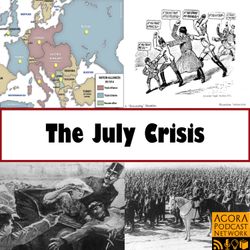
#35: 29 July 1914 I - Hissing Cousins
01:03:50|The dawn of a new day did not bring any new peacemaking opportunities. In their own way, Austria, Germany and Russia were immovable in their main goal - they would not back down, even if it cost them everything.That such a roadblock sat in the way of peace did not prevent Kaiser Wilhelm and Tsar Nicholas from engaging in their famed, eleventh hour telegram exchange. The Nicky-Willy telegrams have often been highlighted as an example of the inherent pacifism of these conservative monarchs, but what hope did this initiative really have?One emerging issue was the increased tensions between Austria and Germany. Despite urging them to do so for several days, Vienna had not provided its ally with any plans for its post-war treatment of Serbia. Frustrated with Austrian intransigence and the refusal to grant concessions to Italy, the German Chancellor pursued a short-lived but incredibly fascinating mission - to drive it home to Austria that if she would not clarify her aims or help herself, Germany was not willing to do the work for her.This potential fracture in the Austro-German camp would only be healed if Russia acted pre-emptively, and engaged in mobilisation. But then again, the Russians could ask, if Germany had not been able to stop Austria to this point, was there any hope she could stop her now? If German influence in Vienna had declined, German mediation may be of little use. And if Germany was still influential, why had she allowed matters to get this far, if she had not agreed with what Austria was doing?It was lose lose for Berlin, and not even the spectacle of the two cousins hissing at each other through barely veiled good wishes could mask the fact that matters had gone very far indeed from the heady days of early July. Russia was mobilising, and though she had not prepared her entire army, she was clearly unwilling to let Austria away with it. Her motives for doing so, and the excuses made to justify such a provocative step, are worth examining, because they get to the root of the July Crisis quandary. Did these contemporaries know what they were doing, or were they blindly following the suggested script off the edge of the abyss?Support the July Crisis series, join the conversation, and find out more through these links:Do you want ad-free episodes with scripts attached, and bonus content? Support us on Patreon and you can suggest July Crisis episodes!Join our Facebook group as we make our way through this fascinating series!Click here to see our July Crisis workspace in Perlego, you'll find every source you need!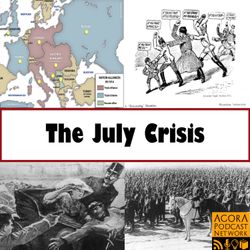
#34: 28 July 1914 III - Britain Tries Again
01:04:32|Although the Austro-Serb War was now a reality, Britain did not know this until the evening of 28 July. In the meantime, Sir Edward Grey was determined to do all he could to make the mediation scheme work. But not everyone Grey dealt with could be described as sincere, and this included members of his own Cabinet.Churchill had acted provocatively and pre-emptively in mobilising the fleet and moving it to its battle stations. The Cabinet remained divided over whether to choose a side, but the dilemma was clear. If she declared herself for Russia and France, those powers would be emboldened, and might take greater risks. If, conversely, she declared neutrality, the same effect could be felt in Berlin and Vienna. The solution was thus - still - to keep her options open, but this did not mean British diplomacy slept on 28 July, far from it.Although the goal was the same, the landscape was rapidly changing under her feet. It was difficult to reconcile Austro-German goals of a limited Serb war with the need Russians felt to defend their Slav brethren. It was at least clear that if the war could be contained, Britain could remain neutral. Yet the space for neutrality was shrinking in line with the escalation in Austro-Serb tensions. By the end of the day, the two foes were at war, and the peaceful hopes of so many had been shattered. The prognosis looked grim, but as had been the case for the last few weeks, Sir Edward Grey had to try.Support the July Crisis series, join the conversation, and find out more through these links:Do you want ad-free episodes with scripts attached, and bonus content? Support us on Patreon and you can suggest July Crisis episodes!Join our Facebook group as we make our way through this fascinating series!Click here to see our July Crisis workspace in Perlego, you'll find every source you need!
Are the Sanctions Against Russia Working? - 'Punishing Putin' by Stephanie Baker
53:01|For two and a half years, Russia has been waging a full scale war against Ukraine. In response, the West has mobilised an economic coalition of states determined to level sanctions against the aggressor, ideally, to force it to the peace table. Clearly, Russia has not been deterred, but how much of an impact are the sanctions really having? In her book Punishing Putin, Stephanie Baker analyses the reality behind these measures, but also their sheer significance. Indeed, we have entered a new era of Russian relations with the west, and there is no going back.Thanksss to Stephanie for joining me, please show your support by getting your excellent new book here [Amazon], also available in your favourite book shop!